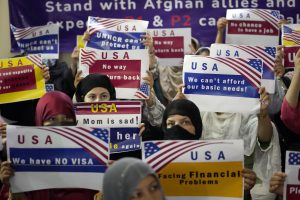When the United States and other NATO nations left Afghanistan as the Taliban seized control in August 2021, hundreds of thousands of Afghans sought refuge in Pakistan. Almost three years later, many still remain, trapped in resettlement limbo – including roughly 20,000 Afghans awaiting promised visas to the United States.
Now, these Afghans face the grave threat of deportation back to their homeland, with Pakistan’s deadline for the second phase of deportation imminent: April 15.
Most fled Afghanistan originally because they had spent years working with U.S. troops and Western organizations. Due to the lengthy U.S. resettlement process, however, they still don’t have the Special Immigration Visas or P-1/P-2 visas they need. Without these documents, the Afghans face forced deportation to their native land, where many are likely to be detained and fiercely persecuted. Taliban leaders, in addition to targeting human rights advocates, journalists, and civil activists, are actively searching for people who worked with U.S. and NATO troops.
The United States has failed to resettle, or even protect, these vulnerable – and eligible – Afghans. The U.S. embassy did contact Pakistani authorities in November and issued protection letters to all Afghans now registered with the United States Refugee Admission Program, but to little effect.
Despite possessing these letters, many Afghan refugees waiting for resettlement were sent home in the first deportation phase in November. Pakistani officials largely ignored the letters – according to them the letters have no legal value – because the U.S. embassy and Pakistani authorities do not yet have an official agreement on the issue.
Washington should enter into a serious negotiation with Islamabad about establishing a Refugee Support Center, required for relocating applicants outside of Pakistan. The failure to address this challenge could place more at-risk Afghans in serious danger during the impending second phase of deportation on April 15. It also highlights an urgent need to take effective measures to ensure the safety of vulnerable individuals.
The current undocumented or uncertain legal status of Afghans in Pakistan exposes them to insecurity, fear, limited legal protections — and the risk of deportation.
Pakistani officials now assert that two key problems block moving forward: first, the inclusion of non-Afghans in the resettlement lists, and second, incomplete information on the refugees awaiting visas. Meanwhile, the U.S. embassy has refused to share more information because of “privacy and security reasons.” Western embassies and the U.N. Refugee Agency (UNHCR), have engaged in extensive discussions with Pakistani authorities to prevent the deportation of people likely to be persecuted in Afghanistan, but there is still no practical solution to the very real dilemma.
More effective and practical steps should be taken by the U.S. embassy and UNHCR to prevent the deportation of Afghans waiting for resettlement in the United States. To achieve this, the U.S. embassy must resolve disagreements over the legal validity of protection letters with the Pakistani government.
The U.S. embassy and the Pakistani authorities should come together to find a way to consider the issues of privacy and security concerns, as well as the necessity for comprehensive and accurate information. In addition, joint lobbying by Western embassies and UNHCR could help pressure Pakistan to exempt from deportation all at-risk Afghans – including those waiting for resettlement visas.
The major problem remains that the deportation challenges affecting refugees in Pakistan stem from a fundamental cause: the lengthy U.S. resettlement process.

































